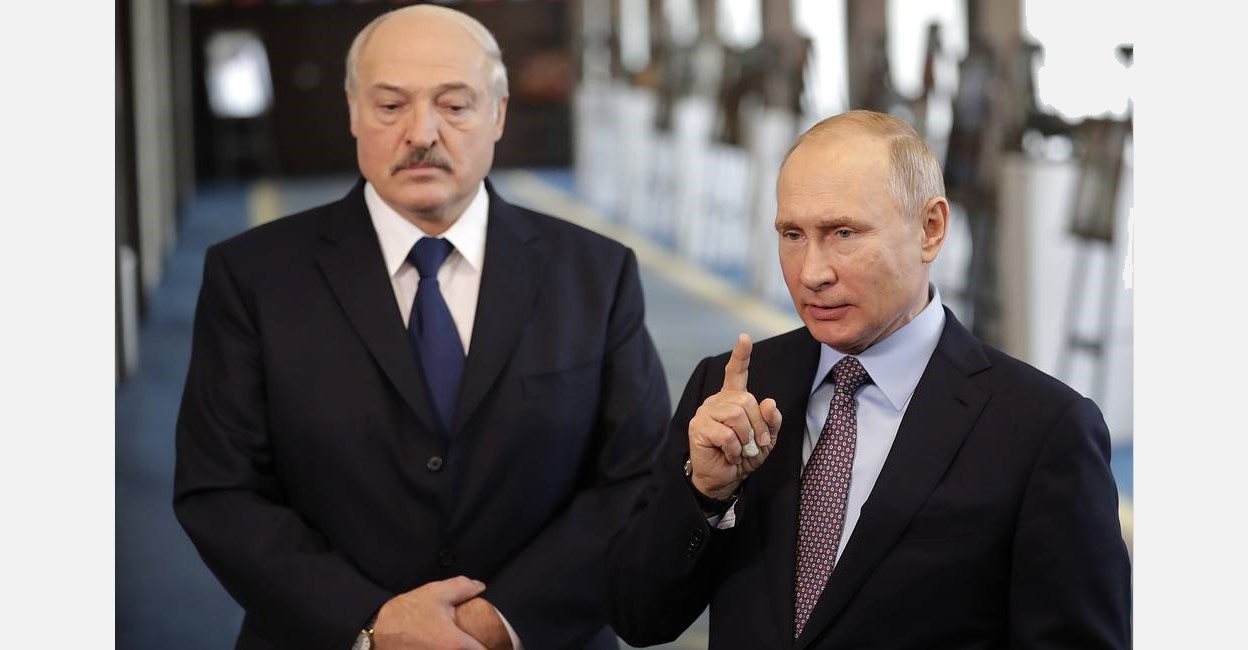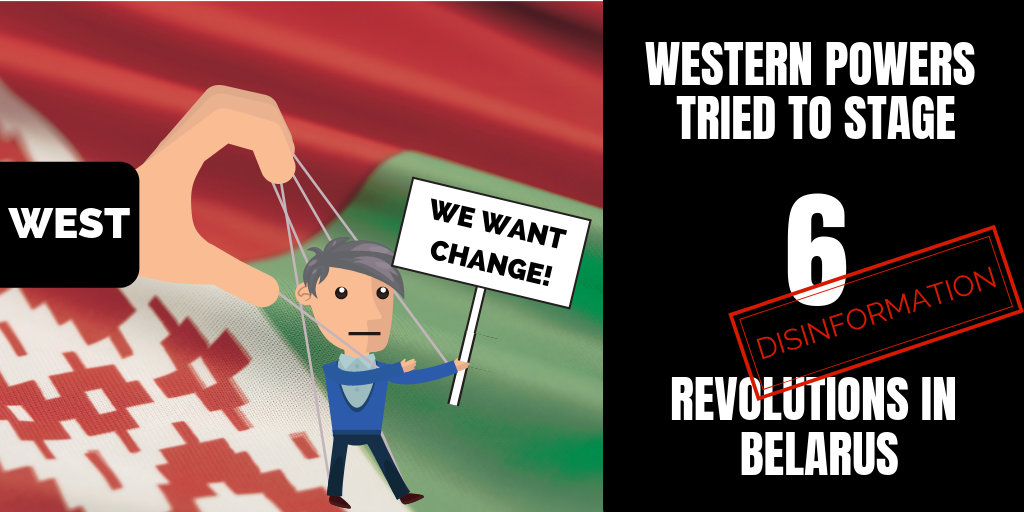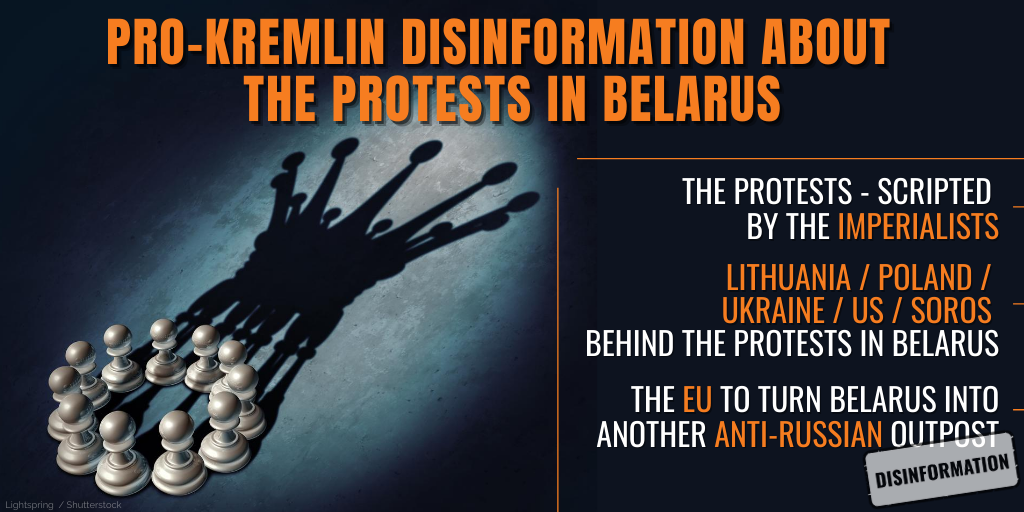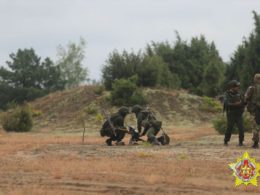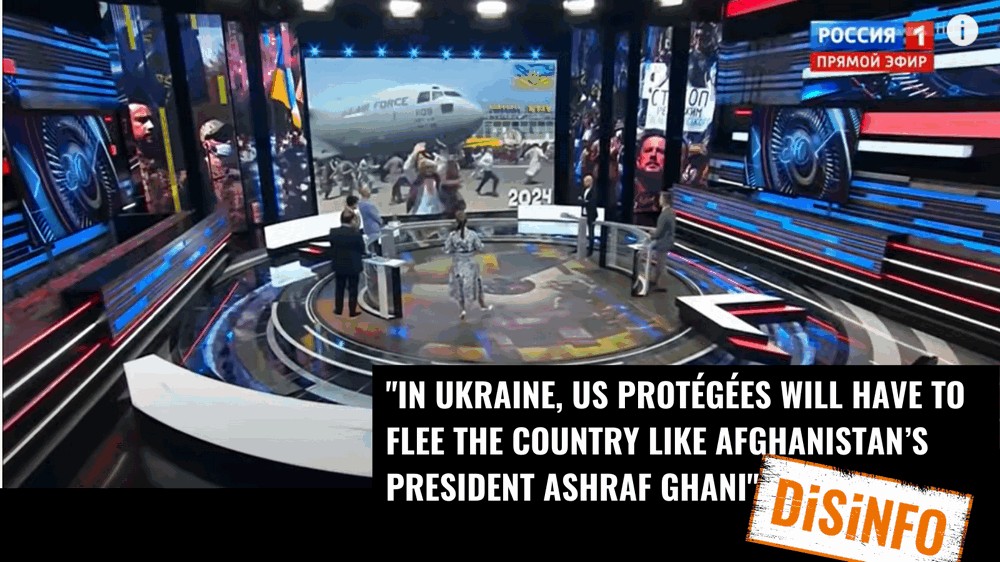The Russian hybrid war in Belarus offers Ukraine a unique opportunity to understand the full extent of the Russian aggression in Ukraine without the distraction of the so-called “war in Donbas.” The development within the political, economic, and information sphere is of particular relevance for Ukraine.
Seen through the prism of hybrid war, it also gives Belarus, Ukraine, and the West a better ability to predict what comes next. Russia will do everything in its power to increase its control over Belarus. Russia will intervene militarily if it is in danger of "losing" Belarus to the West. The military option is – even if it is a last resort – a viable option. It is, however, presently unlikely as Russia is in a far better position, far better prepared and already present, and controlling the evolving situation in Belarus.
Calling for dialogue, the Belarus opposition leader Sviatlana Tsikhanovskaya has stressed that "the revolution in Belarus is not a geopolitical revolution.” "It is neither pro-Russian nor an anti-Russian revolution. It is neither anti-EU, nor a pro-EU revolution, it is a democratic revolution. It is the striving of the people to freely and fairly elect its leaders and decide its destiny," calling on all countries to respect the sovereignty and the territorial integrity of Belarus.
Many observers claim that Belarus 2020 is not Ukraine 2014 and that there is no geopolitical component to the anti-regime protests currently underway in Belarus.
This is a dangerous misconception.
Seen from bottom-up, the protests in Belarus have the appearance of being vastly different from the Revolution of Dignity [of 2014 in Ukraine, - Ed.]. The demonstrations, organization, and key messages are different. The opposition has stressed that they want to keep the close bilateral ties with Russia. None of the polls suggests a wish for a more Western-oriented foreign policy. Their demands are simple: Lukashenka’s resignation, free elections, and release of political prisoners.

With a top-down – or strategic - perspective, however, the situation becomes identical. It is a democratic revolution, triggering a Russian intervention like in Ukraine. Demanding democracy is not a policy of neutrality in a region shaped by the conflicting ideas of Western liberal democracies and the authoritarian “Russian World.”
Democracy, which is the central value of the Western world, constitutes a geopolitical threat to Russia. Any pro-democracy uprising in either Ukraine or Belarus represents an existential threat to both Russia’s authoritarian system as well as its Great Power ambitions. Recent history is full of examples of nations leaving its sphere of interest because of their aspiration for democracy. Russia can afford to lose neither Ukraine nor Belarus to democracy (and consequently, the West).
Or as Peter Dickinson put it:
“Moscow regards any attempts to promote democracy in its neighborhood as intrinsically anti-Russian.”
- Read also: Moscow’s hybrid war against Belarus recalls its actions in Ukraine in 2013, Vlantsevich says
Diplomacy
Both Russia and the EU are responding as they did when the demonstrations in Ukraine erupted. EU is once again “concerned” and Russia cries “foul play” while injecting itself in support of the incumbent President.

Siding with the protesters, the EU has decided to “scale down bilateral cooperation with the Belarusian authorities.” The European Council expressed “its full support for Belarus’s sovereignty and independence and underlines the democratic right of the Belarusian people to elect their president through new, free and fair elections, without external interference.”
Additionally, the EU demanded that the authorities “refrain from any further repression and violence,” and release all those detained, including political prisoners. EU imposed sanctions against 40 Belarusian individuals on 2 October.
Russian messaging and initiatives are according to its “Ukraine 2014 script.” It is using international platforms (e.g. UN and OSCE) bi- and multilateral meetings, briefings, and media to accuse the West of interfering in the internal affairs of Belarus, including the use of sanctions, pressure, and propaganda as tools to replace the existing government.
According to Russia, the sanctions are leading to “further erosion of international law.” Sanctions and threats are “violating one of the key principles of the UN Charter and the OSCE Helsinki Final Act – non-interference in internal affairs.”
Russia has underlined that the future of Belarus must be decided by its population through constitutional reform and national dialogue. Ironically, President Putin simultaneously reaffirmed his “readiness to render the necessary assistance to resolve the challenges facing Belarus based on the principles of the Treaty on the Creation of a Union State, as well as through the Collective Security Treaty Organisation.”
Playing the “history card,” Lavrov claims that Lithuania and Poland in particular “have taken an aggressive position” trying to reclaim additional geopolitical space.
The West is told to keep its hands-off Belarus and what Russia essentially sees as its sphere of interest. Exactly like it did in Ukraine in 2014.
Political
16 August President Putin reaffirmed his readiness to render the necessary assistance to resolve the challenges facing Belarus.
As in Ukraine, Russia argues for “constitutional reform.” Lukashenka, Putin, and the opposition have, however, conflicting visions on the scope.
Lukashenka has suggested reducing the president’s powers in appointing judges, while the opposition wants to change the constitution back to its original form. Putin sees reform of the Belarusian constitution as “logical, timely, and appropriate.” The reforms should be aimed at liberalizing Belarus’s political system through a national dialogue.
Russia’s expectations are in line with the opposition but for hugely different reasons. The Kremlin and the Belarusian opposition both wish to remove Lukashenka from power and turning Belarus into a parliamentary republic.
While the opposition is seeking democracy, Kremlin is seeking a parliament it can corrupt and control.
“Under Lukashenka, no parallel (let alone competing) decision-making authorities were allowed, the president being the only available interlocutor to Russia in Belarus. Effectively monopolizing this role, Lukashenka made it impossible for the Kremlin to playoff Belarusian politicians and interest groups against each other.”

Pro-Russian media in Belarus has recently advocated both a parliamentary republic and further development of the Union with Russia.
The opposition wants Lukashenka to leave immediately, while Russia wants him to stay in office a little bit longer. According to Vladimir Socor, the Kremlin wants Lukashenka “to cooperate with the constitutional reform that would lead to new presidential and parliamentary elections in a parliamentary republic.”
His leadership (even if unwilling) of the process will “preserve the formalities of Belarus’s sovereignty, constitutional continuity, and Russian non-interference in the country’s affairs.” Having the constitutional amendments approved at a national referendum would further strengthen this impression.
[box-right]
Russia’s interests in Belarus, p.2: Shepherding the constitutional reform
[/box-right]
Michael Carpenter and Vlad Kobets describe this as a “soft annexation” of Belarus. An expanded role for parliament, “would ostensibly give power to the people but in practice enable Kremlin-backed puppet parties to exert greater influence», increasing Russia’s present influence over its internal and foreign policy.
Socor describes it as the first-ever Russian regime-changing operation in its “near abroad.”
According to Dzianis Ivashyn, new candidates for the presidential election appeared only three months earlier. They appeared from nowhere; never having taken part in the political process before, nor having claimed the highest office in the state. All of them is seen to have “links to the Russian Federation.”
If the constitutional reform ends up turning Belarus into a parliamentary republic and/or formalizing the Belarusian integration with Russia via the Union State mechanism, the “soft annexation” will have become a reality. This does not differ much from what Russia aims to achieve in Ukraine.
Again, the same situation as in Ukraine 2014, only a different stage of the Hybrid War.
Economy
President Putin granted a $1.5bn loan to Belarus during his meeting with Alyaksandr Lukashenka in Sochi on 14 September. Sounds familiar?
Russia also offered Ukraine major economic assistance just weeks after the demonstrations in Ukraine started.
[boxright]
Russia’s interests in Belarus, p.1. The termination of the grand bargain
[/boxright]
We do not know the exact conditions for either of the economic packages, but most observers believe both came with a demand for closer integration with Russia.
Few ex-Soviet nations have been more dependent on Russia economically and politically than Belarus. According to Valery Karbalevich, “Lukashenka has enough resources to control the situation. The economy is becoming Lukashenka's enemy. His regime is running out of funds.” During his reign, he has maintained “Soviet-style controls over the economy and relied on cheap energy and other subsidies from Russia.” Russia is its main source of external credit. As of the end of the first quarter of 2020, it accounted for about 48% Belarus external public debt ($ 7.92 billion).
According to President Putin, Russia is
“the largest investor in the Belarusian economy. Just one of the projects – a nuclear power plant – is estimated at 10 billion in US dollar terms. In general, over 50 percent of Belarus' foreign trade is with Russia. Almost 2,500 enterprises with Russian capital are operating in Belarus.”
[boxright]
FOR MORE ON THE BELARUSIAN ECONOMY:
The trap of Belarusian economy: between Russian dependence and global uncompetitiveness
[/boxright]
As of January 1, 25% of the assets of the banking sector in Belarus were held by banks with Russian capital. Russia has control over several strategic assets, like the Belarusian gas pipelines used to transit Russian gas to Poland and Germany, and Belarus’s giant Mozyr oil-processing facility.
According to the Russian Central Bank, by the beginning of 2020, the total volume of accumulated Russian investments since 2010 amounted to $ 4.26 billion. However, since a lot of the investments transit through other countries (e.g. Cyprus), the National Statistical Committee of Belarus assesses that the actual investments might be more than four times higher.
Belarus has been under immense pressure to formalize the Union State for years already. Putin has withheld subsidies on oil exports and placed restrictions on Belarusian agricultural exports to Russia in the hope of forcing Lukashenka into submission.
The ongoing pro-democracy uprising will further aggravate Lukashenka’s economic problems. The Belarusian ruble has lost value. The thriving IT-industry considers relocating to other countries. Anders Åslund has pointed out that last time Belarus was in a serious financial crisis (2011),
“the Russian government distributed several big Belarusian companies among Russian companies, but Lukashenka clawed them back.”
President Putin’s statement of 16 August confirming Russia’s "readiness to provide necessary assistance in ironing out emerging problems based on the principles of the treaty on creating the Union State" serves as a reminder to Lukashenka that nothing is for nothing. After all, it was Lukashenka that turned to Moscow for help.
In contrast, Ukraine has on the face of it reduced Russian control over its economy.
The total imports from Russia had fallen from 18% of GDP in 2012 to 6% at the beginning of 2019. The Russian corporate footprint has also decreased. However, as in Belarus, the official data “significantly underestimates Russian investment in Ukraine.” Due to the widespread use of offshore and hidden investment analysts believe that Russian investment in Ukraine is at least two times higher than the official estimates.
Russia’s economic grip on Ukraine is, however, determined by other factors than just trade or investments.
Pro-Russian Ukrainian oligarchs are a part of its “economic weapon.” As is the evolving military threat along the Russian-Ukrainian border, the ongoing military aggression in Donbas, the maritime blockade in the Sea of Azov, and Russian imposed restrictions on Freedom of Navigation in the Black Sea. Even Nord Stream 2 is an integrated part of its effort. The economic weapon is further supported by pro-Russian forces attempting to sabotage reforms and attacking the independence of key institutions like the National Bank of Ukraine, Special Anti-Corruption Prosecutor’s Office, and Anti-Corruption Bureau, to undermine Ukraine’s support from International Monetary Fund, European Union, and the World Bank.
Being utterly dependent on Russian economic support and in a sense, being a part of the Russian World already, Russia is using the economic means to force Belarus to merge with Russia.
Again, the same situation as in Ukraine 2014, only a different stage of the Hybrid War.
Information
Belarus is according to Putin facing an "Unprecedented External Pressure".
[box-right]
Belarusian journalists on strike replaced by Russia’s RT strike-breakers
[/box-right]
It is yet another color revolution orchestrated by the west. Protesters are paid and instructed by the west. This is nothing but a Russophobic provocation and an attempt to spoil relations with Russia. Nazis/fascists are most definitely involved. And because of all the above: Russian values are under threat. One of the novelties in the Belarussian disinformation script is the idea that “Ukrainians are involved”. Attacks on Poland, Ukraine and the Baltic states is a core element in the disinformation on Belarus.
None of the narratives focuses on the free will of the protesters and their desire for fair and free elections, stop to violence and democracy.
Ukraine and Belarus are considered a part of Russia’s near abroad. In Putin’s opinion, the Russian, Ukrainian and Belarussian peoples are almost the same due to the historical, ethnical, cultural, and religious links. This means that what is falsely claimed to be external driven demonstrations also are being portrayed as aimed against Russia. Russian media is therefore framing the ongoing protests in Belarus as a coordinated globalist attack on Russia. Russia, helped by Lukashenka, is presenting the protests as a NATO versus Russia conflict. According to the Belarusian president, NATO has been conducting a military build-up near its western border and claiming “the West hopes of turning his country into a ‘bridgehead against Russia’.”
According to Hanna Liubakova, an investigative journalist and researcher from Belarus, Russian journalists have been invited by Lukashenka to work at state television and in his presidential press pool. “The new arrivals are already spreading pro-Russian narratives and disinformation.” Additionally, Belarus' Ministry of Foreign Affairs canceled all foreign journalist accreditations on October 2. “Lukashenka is likely setting conditions to intensify his censorship campaign.”
Again, the same situation as in Ukraine 2014, only a different stage of the Hybrid War.
Military
While Belarus has avoided direct military aggression and the loss of territory, it has not avoided the deployment of Russian armed forces and security forces on its territory. Like in Crimea in 2014, Russian forces were already in Belarus when the protests started.
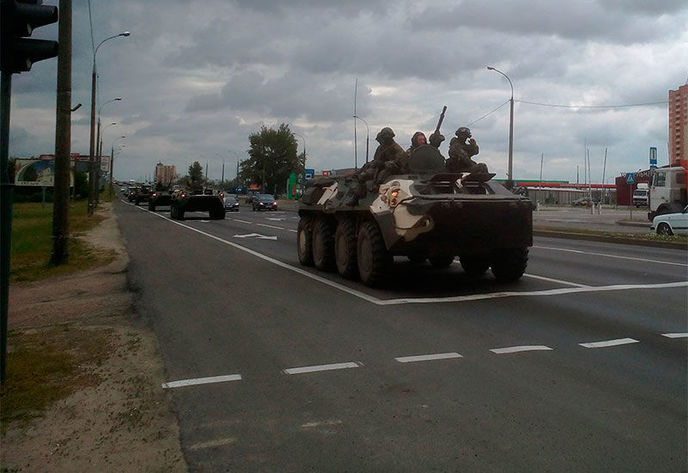
The two nations are linked closely militarily. Russia is leasing a strategic ballistic missile defense and a global communications facility for the Russian navy. The air- and missile-defense system is integrated. Additionally, they have established a regional group comprised of four Belarusian brigades and special forces and the Russian 20th Guards Army. Belarus is also a member of the Russia-led Collective Security Treaty Organization (CSTO).
The numbers of Russian forces increased after the presidential election. 14 September President Putin and President Lukashenka agreed to hold combined exercises on the territory of Belarus almost every month during the next year, allowing Russia to rotate forces in and out of the country (and reinforce the forces already there if needed) under the pretext of exercises.
Additionally, President Putin has recently tasked FSB and the Ministry of Internal Affairs to prepare for negotiations with the Ministry of Internal Affairs of the Republic of Belarus for the deployment of the Russian National Guard to Belarus.
Hybrid War is not about the physical domain (e.g. territory or the military capabilities). The main battlespace is the mind and consequently, the “cognitive spaces of both populations and key decision- and policymakers.”
Having successfully intervened and hindered a leadership change, a military intervention is not (yet) needed. Just as important, Belarus does not need an economic shock an armed conflict trigger (like in Ukraine). Quite the opposite: Belarus does not need destabilization, but stability in order to ensure the desired soft annexation.
Conclusion
Having learned from its hybrid war in Ukraine, Russia acted more resolutely in Belarus. They have helped Lukashenka to regain control over the internal situation and thereby reducing the risk of a regime change (not controlled by Kremlin). Being more fundamentally dependent on Russian economic and political support and therefore, being a part of the Russian World already, Russia has avoided using the extreme measures in Belarus as it did in Ukraine.
- Russia has once again resorted to diplomacy to thwart Western interference while ensuring that Lukashenka is denied Western support. His ability to maintain a geopolitical balancing act between Moscow and the Western world is for the moment, dead, leaving Lukashenka (and ultimately, Belarus) with few alternatives. Russia has succeeded in Belarus, while partly failing in Ukraine.
- The use of political means is now Kremlin’s main effort. Belarus is still basically pro-Russian. Controlling both the economic and information space already, Russia only needs to inject political control through constitutional reform and turning Belarus into a parliamentary republic. Once this is achieved, it will gradually increase its political control like it is trying to achieve in Ukraine.
- The information space is identical to Ukraine, with one major exception. Russia has already gained control over the media and therefore, the narrative. In Ukraine, this process is still evolving.
- The military part of the Hybrid War has the same features as in Ukraine. While Belarus has avoided direct military aggression and the loss of territory, it has not avoided Russian armed forces and security forces on its territory. The Russian demonstration of “will and ability” in Georgia, Ukraine and Syria, and its military build-up of forces along the border of Belarus (and Ukraine) has the same effect on Belarussian key decision-makers, policymakers and society as in Ukraine.
Seen through the prism of hybrid war, it also gives Belarus, Ukraine, and the West a better ability to predict what comes next. Russia will do everything in its power to increase its control over Belarus. Russia will intervene militarily if it is in danger of "losing" Belarus to the West. The military option is – even if it is a last resort – a viable option. It is, however, presently unlikely as Russia is in a far better position, far better prepared and already present, and controlling the evolving situation in Belarus.
[boxright]
What if Russia wins in Ukraine? Consequences of Hybrid War for Europe (Part 2)
[/boxright]
Keir Giles concludes that a “The presence of Russian forces in Belarus -- along with the air and missile forces they could be expected to bring with them -- would substantially alter the security situation for a wide area of Central Europe."
This is totally in line with my article discussing the costs for Europe if Russia succeeds in Ukraine. In my opinion, the consequences for both Ukraine and Europe would be devastating if Russia wins. If Russia succeeds in both Ukraine and Belarus, however, European security will be in peril.
It is time for the West to change its strategy towards Russia. Making certain that Belarus does not remain only dependent on Russia might be a first, crucial step.
Read more:
- Moscow’s hybrid war against Belarus recalls its actions in Ukraine in 2013, Vlantsevich says
- Zelenskyy is solving the wrong war
- Belarusian, Russian state-run media tweak disinformation narratives to conform them to each other
- What if Russia wins in Ukraine? Consequences of Hybrid War for Europe. Part 2
- What if? Hybrid War and consequences for Europe. Part 1
- Portnikov: Belarus should be seen through prism of Ukraine’s 2004 Orange Revolution, but not 2014 Euromaidan
- Belarusian journalists on strike replaced by Russia’s RT strike-breakers
- While nobody is watching, COVID-19 may allow Russia to reach its strategic aim and objectives
- Belarusian transition more likely to follow Armenian rather than Ukrainian scenario, Lukyanov says
- The basis for a peaceful resolution of the war in eastern Ukraine
- Propaganda contractors: Russian state TV airs staged interview to denigrate Ukraine
- More Crimea-like annexations are possible, Moscow scholar says

